 Petzlover
Petzlover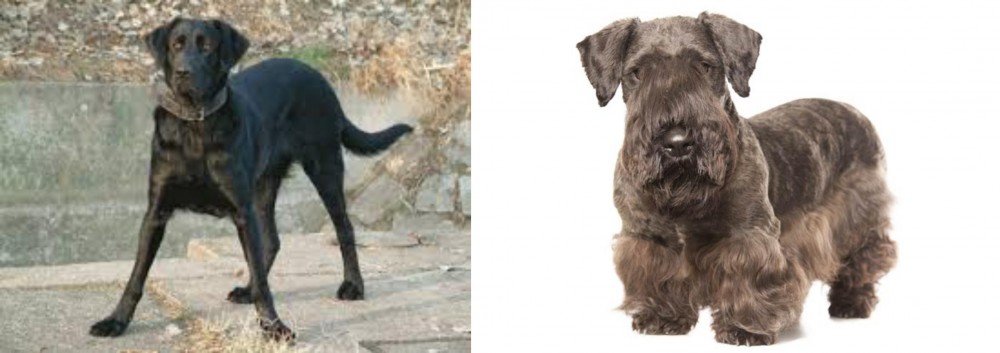 Cao de Castro Laboreiro is originated from Portugal but Cesky Terrier is originated from Czech Republic. Cao de Castro Laboreiro may grow 33 cm / 13 inches higher than Cesky Terrier. Cao de Castro Laboreiro may weigh 60 kg / 133 pounds more than Cesky Terrier. Cao de Castro Laboreiro may live 3 years less than Cesky Terrier. Cao de Castro Laboreiro may have more litter size than Cesky Terrier. Cao de Castro Laboreiro requires Low Maintenance. But Cesky Terrier requires Moderate Maintenance
Cao de Castro Laboreiro is originated from Portugal but Cesky Terrier is originated from Czech Republic. Cao de Castro Laboreiro may grow 33 cm / 13 inches higher than Cesky Terrier. Cao de Castro Laboreiro may weigh 60 kg / 133 pounds more than Cesky Terrier. Cao de Castro Laboreiro may live 3 years less than Cesky Terrier. Cao de Castro Laboreiro may have more litter size than Cesky Terrier. Cao de Castro Laboreiro requires Low Maintenance. But Cesky Terrier requires Moderate Maintenance
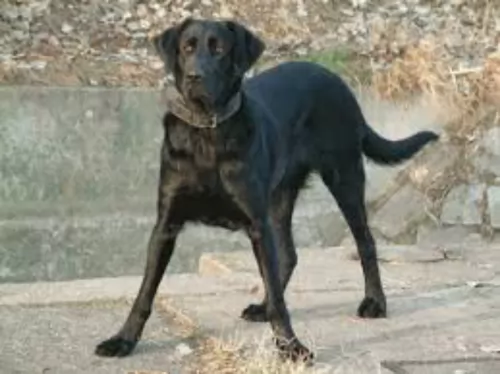 Cão de Castro Laboreiro originates from Portugal. Also known as the Portuguese Cattle Dog he was used long ago to guard livestock. Today, the modern Cao de Castro Laboreiro is descended from the molosser type dog.
Cão de Castro Laboreiro originates from Portugal. Also known as the Portuguese Cattle Dog he was used long ago to guard livestock. Today, the modern Cao de Castro Laboreiro is descended from the molosser type dog.
There are hints to the dog's origins from the 19th century, but changes in agricultural methods meant a disappearance of the dog as a livestock protector. Today the dog is mostly kept as a pet and was first seen at a dog show in 1914.
The Cão de Castro Laboreiro is recognized by the Fédération Cynologique Internationale as well as being recognized by the United Kennel Club in the United States.It is a rare dog and not many exist today but in Portugal, the USA and United Kingdom you will find a few breeders.
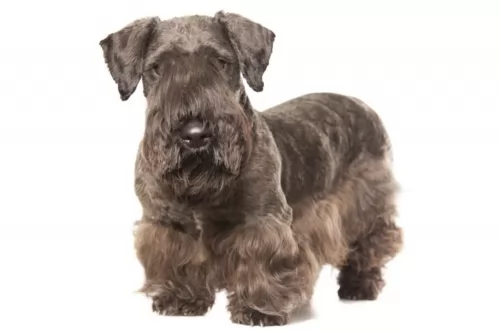 Known as the Bohemian Terrier and looking similar to a Scottish Terrier dog, the Cesky Terrier is a dog breed that has been created by Frantisek Horak, in the Czech Republic.
Known as the Bohemian Terrier and looking similar to a Scottish Terrier dog, the Cesky Terrier is a dog breed that has been created by Frantisek Horak, in the Czech Republic.
Horak wanted to breed a type of hunting dog, and in 1949, using both the Scottish Terrier ad the Sealyham Terrier, he bred the two, creating a new breed that would hopefully be a stronger hunting dog.
The Cesky Terrier was shown for the first time in 1959 and was recognized by the Federation Cynologique Internationale in 1963 and in 1993 by the United Kennel Club. It’s a rare dog this, and is the national dog of the Czech Republic.
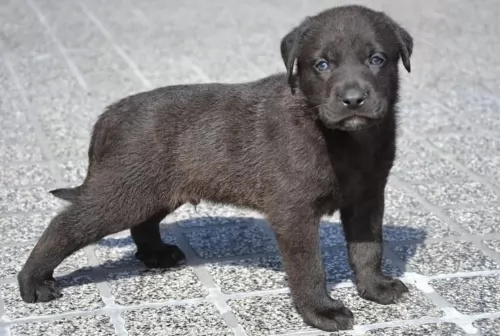 The Cão de Castro Laboreiro is a large dog, with height being in the region of 55 to 60cm and weight being in the region of 45 - 70kg. People describe the dog as wolf-like with a coat that is fairly short, thick and course. The coat is brindle with a base color of shades of grey, chestnut and black.
The Cão de Castro Laboreiro is a large dog, with height being in the region of 55 to 60cm and weight being in the region of 45 - 70kg. People describe the dog as wolf-like with a coat that is fairly short, thick and course. The coat is brindle with a base color of shades of grey, chestnut and black.
This large mastiff-type dog always has a black nose, his tail is long and carried high, but never curling over the back. He has a broad head and is much like the Labrador in looks, being free of wrinkles on the face.The ears of the Cao de Castro Laboreiro are medium-in-size and floppy while the eyes are dark brown.
The Cao de Castro Laboreiro makes an excellent pet as he forms strong bonds with his human family. He is territorial and makes an exceptional guard dog. He doesn’t particularly like strangers and is aloof around them.
This is an intelligent dog breed, he is strong-willed and stubborn, but when he is around the children in the family he is gentle and loving. When he has been trained and socialized, which is always highly recommended with every dog, he gets along with other pets in the home too.
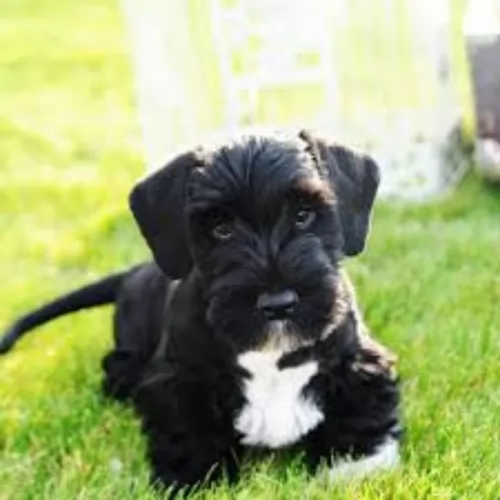 The Cesky Terrer is a longish dog, much like the Scottie and he also has short legs. He is roughly 29ck in height at the withers, is about 43cm in length and weighs anything from 5 to 10kg.
The Cesky Terrer is a longish dog, much like the Scottie and he also has short legs. He is roughly 29ck in height at the withers, is about 43cm in length and weighs anything from 5 to 10kg.
The coat of this dog is long, silky and quite wavy and can be in a number of different shades of gray or a light brown color. Puppies are born black. The soft coat can be kept groomed by clippers or you can take him to have his coat professionally trimmed.
This dog breed has natural drop ears, unlike the Scottie which has erect ears. The tail length is 18-20 cm and low set.
A loyal, quiet and loving family dog, the Cesky Terrier will get on well with children in the home and he is also friendly with other dogs. Just like with any other dog, it will be important to socialize the dog breed at an early age as then he becomes obedient, smart and relaxed. He is a breed which is also easy to train. He also makes a good watchdog.
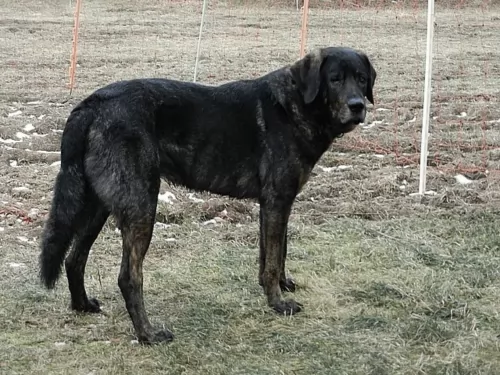 Environment and upbringing have plenty to do with how a dog turns out. People who just buy a dog for guardian purposes and nothing else can’t expect companionship in return.
Environment and upbringing have plenty to do with how a dog turns out. People who just buy a dog for guardian purposes and nothing else can’t expect companionship in return.
The Cão de Castro Laboreiro has always been a fearless guardian of livestock with his strong protective characteristics. He is intelligent and recognizes that a child in the family needs his protection.
This is a large dog who is strong, brave and intelligent but with his human family he is gentle, loving and loyal. Nonetheless he still requires a firm owner, and if you’re fair and firm with him you get the best with him. With this dog you can form a close friendship and bond.
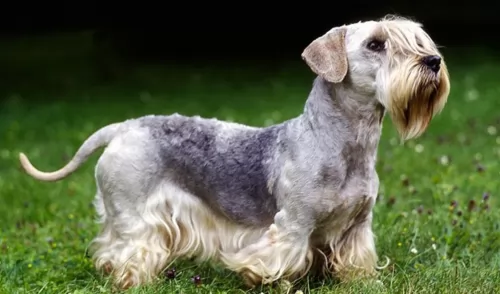 The Cesky Terrier isn’t a small-dog yapper and he will adapt to life in the city or the country. He is a small dog, but he is feisty and sporty and will willingly join you with your jogging or when you go on a walk.
The Cesky Terrier isn’t a small-dog yapper and he will adapt to life in the city or the country. He is a small dog, but he is feisty and sporty and will willingly join you with your jogging or when you go on a walk.
He is intelligent and playful and when you add in characteristics such as being courageous, loving, loyal and feisty, you can see that the Cesky Terrier is guaranteed to make a super family pet.
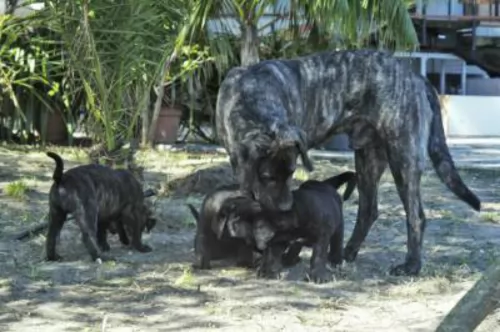 The Cão de Castro Laboreiro is generally a healthy breed, but even so, it is good to be aware of typical canine diseases that your pet may develop.
The Cão de Castro Laboreiro is generally a healthy breed, but even so, it is good to be aware of typical canine diseases that your pet may develop.
There are many eye problems that dogs have to contend with and if you see any kind of ulceration in your dogs eye, get veterinary advice.
A dog should always have access to a shady spot. Never ever leave your dog in a hot car. Heat builds up quickly and death can result soon as the body temperature rises.
Roundworm and tapeworm can infest dogs and you’ll need to speak to your vet about a worming program. Lice, mites and ticks are all parasites which attach themselves to the skin.
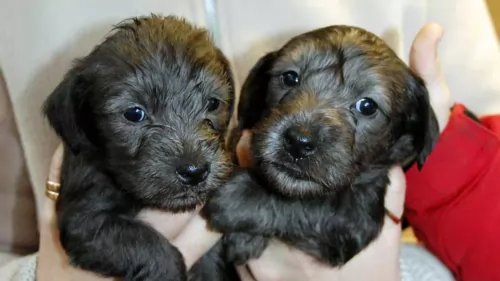 The Cesky Terrier is generally a healthy dog, but this breed sometimes suffers from common dog ailments that other breeds also have to contend with.
The Cesky Terrier is generally a healthy dog, but this breed sometimes suffers from common dog ailments that other breeds also have to contend with.
Eye disorders, ear infections, pancreatitis, hip dysplasia and weight gain are just some health issues you might need to be aware of.
Remember that if you want to promote a healthier dog, feeding him a quality diet and taking him immediately to the vet when you suspect a problem can keep him free from common dog illnesses.
Pancreatitis for instances develops when the pancreas becomes inflamed, and this can be brought on by allowing your pet to become obese. There are other reasons for pancreatitis too such as infection. You will see diarrhea, fever and vomiting with your pet as well as discomfort from abdominal pain. It’s a disease which affects smaller dogs more often than larger breeds.
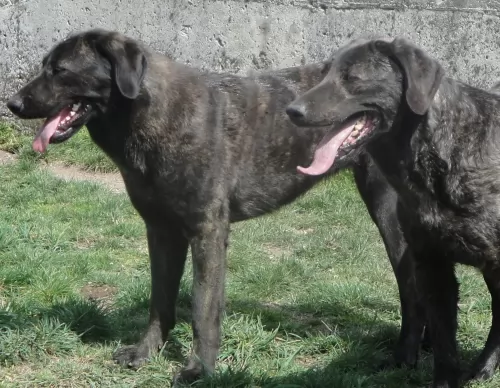 The Cao de Castro Laboreiro has a short coat which requires minimal grooming. Brushing him twice a week to rid him of loose hairs will suffice.
The Cao de Castro Laboreiro has a short coat which requires minimal grooming. Brushing him twice a week to rid him of loose hairs will suffice.
Nail clipping as well as ear- and teeth cleaning are other routine maintenance procedures for your pet.
The food you give your pet must be well-balanced and have protein and carbohydrates. If you want his skin and hair to remain healthy, vitamins, fatty acids and minerals will also be needed.
Boneless chicken and fish, brown rice and vegetables can be a good choice as well as some of the top quality commercially manufactured foods. An active dog will always need a higher protein content and therefore including raw meat into the diet is imperative – not every day as it can be very expensive, but every other day.
Remember that bones can be dangerous as they can splinter and cause your pet internal damage. Fresh, cool water must be available at all times.
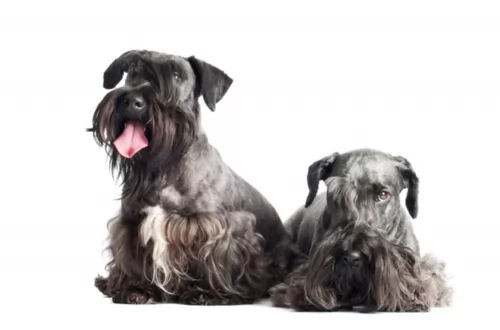 Cesky Terriers may well be a little bit less active and quieter than other terriers, but they will still need a good dose of exercise. He loves to dig, and if he is bored and doesn’t have a plenty of exercise and games, he will want to dig more and cause the owner a lot of frustration. Take him for daily walks and give him some ball games in the garden.
Cesky Terriers may well be a little bit less active and quieter than other terriers, but they will still need a good dose of exercise. He loves to dig, and if he is bored and doesn’t have a plenty of exercise and games, he will want to dig more and cause the owner a lot of frustration. Take him for daily walks and give him some ball games in the garden.
Cesky Terriers will need brushing down at least twice a week and their coats will need to be trimmed into shape every 8 to 10 weeks or so. You’ll also need to check excess hair inside the ears.
As with any dog breed, you will need to check on his nails so that they don’t grow too long and also brush his teeth 2 or 3 times a week to avoid dental disease.